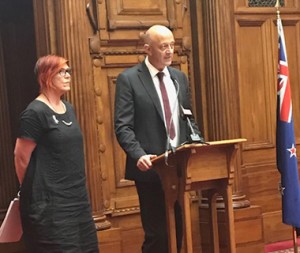Every 4 Minutes

New Zealanders must understand the importance of childhood and reduce children’s exposure to adverse experiences if we want to reduce incarceration rates, says Dr Ian Lambie, Chief Science Advisor to the Justice Sector.
In Every 4 Minutes(external link), A discussion paper on preventing family violence in New Zealand launched at Parliament today, Dr Lambie has set out the links between the trauma caused by family violence and our high prison population.
“All of us must take responsibility for starting to repair the damage and distress that family violence does to our society. We need everyone knowing about, and beginning to think about, what we can do collectively about family violence. It’s everyone’s responsibility to reject and prevent violence,” Dr Lambie says.
The paper says family violence can be prevented through:
- Effective investment in families with children
- Media and awareness raising campaigns
- Ensuring public servants and community practitioners have the capacity and capability to enable prevention and early intervention.
Dr Lambie says scientists have found that exposure to violence can impact the biological development of a child’s brain and body.
“They negatively affect a child’s physical and psychosocial health, through upsetting the neuroendocrine and immune systems, and brain development critical for learning and memory. This impacts mental health, physical health and behaviour. Exposure to violence significantly increases the likelihood of criminal offending.”
Most criminal offenders have themselves been targets of violence:
- 80% of child and youth offenders have experience of family violence
- 87% of young offenders aged 14-16 years in 2016/17 had prior care and protection reports
- 75% of women in prison have reported family violence and sexual violence
- A history of sexual abuse is the strongest predictor of reoffending by young females.
“Over the past 10-15 years there have been numerous calls for Aotearoa New Zealand to create a culture that prioritises investment in children’s early years and supports parents to nurture their babies. It is time to act on the evidence. There is much more that can be done to create the conditions for wellbeing in families and whānau. The evidence shows this is essential to preventing violence and reducing our incarceration rates,” says Dr Lambie.
Under-Secretary to the Minister of Justice (Domestic and Sexual Violence Issues), Jan Logie MP, received the discussion paper, saying it was a welcome contribution to the government’s work on a national strategy and action plan on family violence and sexual violence.